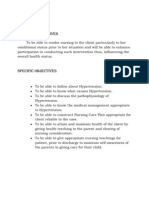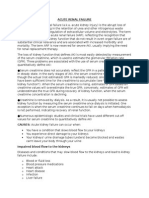Blood Chemistry
Blood Chemistry
Uploaded by
Hal Theodore Maranian BallotaCopyright:
Available Formats
Blood Chemistry
Blood Chemistry
Uploaded by
Hal Theodore Maranian BallotaCopyright
Available Formats
Share this document
Did you find this document useful?
Is this content inappropriate?
Copyright:
Available Formats
Blood Chemistry
Blood Chemistry
Uploaded by
Hal Theodore Maranian BallotaCopyright:
Available Formats
BLOOD CHEMISTRY
NORMAL TEST Blood urea nitrogen (BUN) VALUE* 7-18 mg/dL CLINICAL SIGNIFICANCE Increased in renal disease and dehydration; decreased in liver damage and malnutrition Carbon dioxide (CO2) (includes bicarbonate) 23-30 mmol/L Useful to evaluate acid-base balance by measuring total carbon dioxide in the blood: Elevated in vomiting and pulmonary disease; decreased in diabetic acidosis, acute renal failure, and hyperventilation Chloride (Cl) 98-106 mEq/L Increased in dehydration, hyperventilation, and congestive heart failure; decreased in vomiting,diarrhea, and fever Creatinine 0.6-1.2 mg/dL Produced at a constant rate and excreted by the kidney; increased in kidney disease Glucose Fasting: 70110 mg/dL Random: 85-125 mg/dL Potassium (K) 3.5-5 mEq/L Increased in diabetes and severe illness; decreased in insulin overdose or hypoglycemia Increased in renal failure, extensive cell damage, and acidosis; decreased in vomiting, diarrhea, and excess administration of diuretics or IV fluids Sodium (Na) 101-111 mEq/L or 135-148 mEq/L (depending on test) Increased in dehydration and diabetes insipidus; decreased in overload of IV fluids, burns,diarrhea, or vomiting Alanine aminotransferase 10-40 U/L Used to diagnose and monitor
(ALT)
treatment of liver disease and to monitor the effects of drugs on the liver; increased in myocardial infarction
Albumin
3.8-5.0 g/dL
Albumin holds water in blood; decreased in liver disease and kidney disease
Albumin-globulin ratio (A/G ratio)
Greater than 1
Low A/G ratio signifies a tendency for edema because globulin is less effective than albumin at holding water in the blood
Alkaline phosphatase (ALP)
20-70 U/L (varies by method)
Enzyme of bone metabolism; increased in liver disease and metastatic bone disease
Amylase
21-160 U/L
Used to diagnose and monitor treatment of acute pancreatitis and to detect inflammation of the salivary glands
Aspartate aminotransferase (AST)
0-41 U/L (varies)
Enzyme present in tissues with high metabolic activity; increased in myocardial infarction and liver disease
Bilirubin, total
0.2-1.0 mg/dL
Breakdown product of hemoglobin from red blood cells; increased when excessive red blood cells are being destroyed or in liver disease
Calcium (Ca)
8.8-10.0 mg/dL
Increased in excess parathyroid hormone production and in cancer; decreased in alkalosis, elevated phosphate in renal failure, and excess IV fluids
Cholesterol
120-220 mg/dL desirable range
Screening test used to evaluate risk of heart disease; levels of 200 mg/dL or above indicate
increased risk of heart disease and warrant further investigation Creatine phosphokinase (CPK or CK) Men: 38174 U/L Women: 96-140 U/L Elevated enzyme level indicates myocardial infarction or damage to skeletal muscle. When elevated,specific fractions (isoenzymes) are tested for Gamma-glutamyl transferase (GGT) Men: 6-26 U/L Women: 418 U/L Globulins 2.3-3.5 g/dL Used to diagnose liver disease and to test for chronic alcoholism Proteins active in immunity; help albumin keep water in blood Iron, serum (Fe) Men: 75175 g/dL Women:65165 /dL High-density lipoproteins (HDLs) Men: 30-70 mg/dL Women:3085 mg/dL Lactic dehydrogenase(LDH or LD) 95-200 U/L (Normal ranges vary greatly) Enzyme released in many kinds of tissue damage, including myocardial infarction, pulmonary infarction, and liver disease Lipase 4-24 U/L (varies with test) Low-density lipoproteins (LDLs) Magnesium (Mg) 80-140 mg/dL 1.3-2.1 mEq/L Enzyme used to diagnose pancreatitis Used to evaluate the risk of heart disease Vital in neuromuscular function; decreased levels may occur in malnutrition, alcoholism, pancreatitis, diarrhea Phosphorus ((Page*)) (inorganic) 2.7-4.5 mg/dL Evaluated in response to calcium; main store is in bone: elevated in kidney disease; decreased in excess Uric acid Men: 3.57.2 mg/dL Women:2.66.0 mg/dL Triglycerides Men: 40160 mg/dL Women: 35-135 mg/dL Triiodothyronine (T3) 120-195 mg/dL Decreased in iron deficiency and anemia; increased in hemolytic conditions Used to evaluate the risk of heart disease Thyroidstimulatinghormone (TSH) 0.5-6 mlU/L Serum glutamic oxalacetic transaminase (SGOT) Serum glutamic pyruvic transaminase (SGPT) Thyroxin (T4) 5-12.5 g/dL (varies) > > Protein, total 6-8 g/dL
parathyroid hormone Increased in dehydration, multiple myeloma;decreased in kidney disease, liver disease, poor nutrition, severe burns, excessive bleeding See Aspartate aminotransferase (AST) See Alanine aminotransferase (ALT) Screening test of thyroid function; increased in hyperthyroidism; decreased in myxedema and hypothyroidism Produced by pituitary to promote thyroid gland function; elevated when thyroid gland is not functioning Elevated in specific types of hyperthyroidism An indication of ability to metabolize fats; increased triglycerides and cholesterol indicate high risk of atherosclerosis Produced by breakdown of ingested purines in food and nucleic acids; elevated in kidney disease, gout, and leukemia
You might also like
- HILLIGOSS Family HistoryDocument81 pagesHILLIGOSS Family HistoryPamela SteppNo ratings yet
- Case Study - Mike Kelly - HTN-Atherosclerosis - STUDENT-1Document11 pagesCase Study - Mike Kelly - HTN-Atherosclerosis - STUDENT-1Chaos simmonsNo ratings yet
- Endocrine DisordersDocument5 pagesEndocrine DisordersBilly Ray VillanuevaNo ratings yet
- Mazo Riascos Review of Systems ChecklistDocument1 pageMazo Riascos Review of Systems Checklistammen17No ratings yet
- Nephrology - Proteinuria - SOAP Note - Manish Suneja PDFDocument4 pagesNephrology - Proteinuria - SOAP Note - Manish Suneja PDFΝίκος ΣυρίγοςNo ratings yet
- Hypertension BrochureDocument2 pagesHypertension Brochureapi-300387547100% (1)
- Court County Death: Minnesota Hennepin GeegndjudicialDocument10 pagesCourt County Death: Minnesota Hennepin GeegndjudicialGoMNNo ratings yet
- ValuesDocument19 pagesValuescabrerahazel100% (1)
- Blood Sample Normal Panic Values For Abgs: Clinical SignificanceDocument7 pagesBlood Sample Normal Panic Values For Abgs: Clinical SignificancegeonarcisoNo ratings yet
- Laboratory Data InterpretationDocument24 pagesLaboratory Data InterpretationDanish Kamal100% (2)
- ATI Lab ValuesDocument4 pagesATI Lab ValuesWhite BoiNo ratings yet
- Hepatorenal Syndrome, A Simple Guide To The Condition, Diagnosis, Treatment And Related ConditionsFrom EverandHepatorenal Syndrome, A Simple Guide To The Condition, Diagnosis, Treatment And Related ConditionsNo ratings yet
- Running Head: MEDICATION CHART 1Document5 pagesRunning Head: MEDICATION CHART 1jason Anderson100% (2)
- Normal Lab ValuesDocument2 pagesNormal Lab ValuesPedia TricNo ratings yet
- Head To Toe AssessmentDocument3 pagesHead To Toe Assessmentsandaman2225No ratings yet
- Sbar 2011Document2 pagesSbar 2011Brian Esser100% (1)
- Pituitary Disorders - Adrenal Disorders - Thyroid DiseasesDocument207 pagesPituitary Disorders - Adrenal Disorders - Thyroid Diseasesnurliah armandNo ratings yet
- Coretools 18 MonthvisitDocument5 pagesCoretools 18 Monthvisitapi-258835369No ratings yet
- Generic Name Captopril Brand NamesDocument18 pagesGeneric Name Captopril Brand NamesAiko Villacortes100% (1)
- Antihypotensive Drugs: Roger Joseph Ii Ramos Jecino, RN, M.DDocument28 pagesAntihypotensive Drugs: Roger Joseph Ii Ramos Jecino, RN, M.DFranz Earl Niño AlbesaNo ratings yet
- Fluval Sea A3983 A3984 A3985 Marine Reef Performance Led Instructions Int 14Document8 pagesFluval Sea A3983 A3984 A3985 Marine Reef Performance Led Instructions Int 14CezarNo ratings yet
- Cardiac Pre Class Minilecture Lewis 10-2018-2Document27 pagesCardiac Pre Class Minilecture Lewis 10-2018-2Jasmine LiraNo ratings yet
- Dictionary of Blood TestsDocument6 pagesDictionary of Blood Teststvland1098No ratings yet
- Clinical Organization Sheet NursingDocument1 pageClinical Organization Sheet NursingSarah S100% (1)
- Hypertension Ideal Care Plan - 2018Document2 pagesHypertension Ideal Care Plan - 2018DanNo ratings yet
- Psychotherapeutic Drugs: Pam Pam LamDocument7 pagesPsychotherapeutic Drugs: Pam Pam Lamchubbygunny_29776413No ratings yet
- General Population (No Diabetes or CKD) Diabetes or CKD PresentDocument1 pageGeneral Population (No Diabetes or CKD) Diabetes or CKD PresentMuthia ArsilNo ratings yet
- Drug Therapy For GI Disorders PDFDocument5 pagesDrug Therapy For GI Disorders PDFmeeraNo ratings yet
- Hypertension Protocol PDFDocument2 pagesHypertension Protocol PDFHitesh PednekarNo ratings yet
- Pead 3 - Abdominal Pain and VommitingDocument22 pagesPead 3 - Abdominal Pain and Vommitingbbyes100% (1)
- Sepsis Quick Reference GuideDocument1 pageSepsis Quick Reference GuideRavin DebieNo ratings yet
- HypertensionDocument19 pagesHypertensionmr_coolz282344No ratings yet
- Interpreting Laboratory Values in Older AdultsDocument11 pagesInterpreting Laboratory Values in Older AdultsmaeNo ratings yet
- Health Assessment TAKE HOME ASSIGNMENT CH 4 The Complete Health History Name - Section - DateDocument5 pagesHealth Assessment TAKE HOME ASSIGNMENT CH 4 The Complete Health History Name - Section - DateAndy NguyenNo ratings yet
- Mineral Function Deficiency Over Food Source MacromineralsDocument2 pagesMineral Function Deficiency Over Food Source MacromineralsSonny Dizon PareñasNo ratings yet
- Vitamin Chart.2Document3 pagesVitamin Chart.2ashdmb217No ratings yet
- Disorders of The Parathyroid GlandsDocument30 pagesDisorders of The Parathyroid Glandsikram ullah khan100% (1)
- Acute Renal Failure StudyDocument4 pagesAcute Renal Failure StudyElyne BicaldoNo ratings yet
- Final Coaching DrugsDocument8 pagesFinal Coaching DrugsSherlyn BesasNo ratings yet
- Pharmacology Cardiovascular DrugsDocument27 pagesPharmacology Cardiovascular DrugsMitzel AlvaranNo ratings yet
- Commonly Abused Drugs ChartDocument2 pagesCommonly Abused Drugs ChartNerpNo ratings yet
- Hypoglycemia and HyperglycemiaDocument1 pageHypoglycemia and HyperglycemiaMa Cheryll Dueñas100% (1)
- Buletin Lp.3Document2 pagesBuletin Lp.3Joana B. NikolovaNo ratings yet
- Heart Sound & MurmursDocument11 pagesHeart Sound & MurmursTraceyNo ratings yet
- Bates Physical Exam Video NotesDocument3 pagesBates Physical Exam Video Notesdulcedeleche12359No ratings yet
- History and Physical Examination TemplateDocument3 pagesHistory and Physical Examination TemplateRawa MuhsinNo ratings yet
- Hyperlipidemia: Revised: October 4, 2019Document7 pagesHyperlipidemia: Revised: October 4, 2019HannaNo ratings yet
- Labs Electrolyte ChartDocument1 pageLabs Electrolyte ChartmdcmepNo ratings yet
- GI Signs and SymptomsDocument40 pagesGI Signs and SymptomsJohnny BeeNo ratings yet
- Definition:: I. Diagnostic Tests 1. Phases-Pretests Intratests Post Tests 2. Blood Tests - CBCDocument13 pagesDefinition:: I. Diagnostic Tests 1. Phases-Pretests Intratests Post Tests 2. Blood Tests - CBCKelly Sosa LuyunNo ratings yet
- Internal Medicine Topic List 2015Document3 pagesInternal Medicine Topic List 2015Krystal Mae LopezNo ratings yet
- Lab Values Chart 120511 PDFDocument5 pagesLab Values Chart 120511 PDFVanessaMUeller100% (3)
- Chapter 10 Assessment and Management of Patients With Endocrine DisordersDocument65 pagesChapter 10 Assessment and Management of Patients With Endocrine DisordersMYLENE GRACE ELARCOSA100% (2)
- CKD UnsoedDocument42 pagesCKD UnsoedSutan Malik IbrahimNo ratings yet
- SOAP Notes-WPS OfficeDocument11 pagesSOAP Notes-WPS OfficeNexi anessaNo ratings yet
- Subsequent Inpatient Visit NoteDocument4 pagesSubsequent Inpatient Visit NoteJanu easwarNo ratings yet
- 50 Most Commonly Prescribed Medications 02Document4 pages50 Most Commonly Prescribed Medications 02Jelly Bean100% (1)
- 1.113.medication Administration TimingDocument14 pages1.113.medication Administration TimingSophiaNo ratings yet
- 7.8 Collect Data & Come Up With Plan For Day & Nursing Diagnosis Pre-Conference 8-9 Vitals Then Chart, AM Care, StartDocument2 pages7.8 Collect Data & Come Up With Plan For Day & Nursing Diagnosis Pre-Conference 8-9 Vitals Then Chart, AM Care, StartSade' CovingtonNo ratings yet
- Heart Failure and Ejection FractionDocument1 pageHeart Failure and Ejection FractionCecil-An DalanonNo ratings yet
- Complete Normal Physical Exam PDFDocument3 pagesComplete Normal Physical Exam PDFFrancisco Casio MataNo ratings yet
- The Nurse Practitioner in UrologyFrom EverandThe Nurse Practitioner in UrologyMichelle LajinessNo ratings yet
- RH Isoimmunization DR SamiraDocument37 pagesRH Isoimmunization DR Samiragynaecology2010100% (2)
- Malaysia Health 2005Document267 pagesMalaysia Health 2005Mohd Haniff Abdul Rahman100% (1)
- CSC Form 211 - Medical Certificate PDFDocument1 pageCSC Form 211 - Medical Certificate PDFVonAlvarezNo ratings yet
- Anterior Cross Bites in Primary Mixed Dentition PedoDocument32 pagesAnterior Cross Bites in Primary Mixed Dentition PedoFourthMolar.comNo ratings yet
- CLEA 2015 (ASIA-INDIA) AppellantsDocument30 pagesCLEA 2015 (ASIA-INDIA) AppellantsAmol Mehta86% (7)
- Artaud-The Theatre and Its DoubleDocument160 pagesArtaud-The Theatre and Its Doublefoxbinder100% (6)
- Image Receptors - For Dental Radiology SeminarDocument67 pagesImage Receptors - For Dental Radiology SeminarPuneet Choudhary50% (2)
- Enter The Kettlebell RevolutionDocument19 pagesEnter The Kettlebell RevolutionVann GodfreyNo ratings yet
- Health and Hospitals PDFDocument50 pagesHealth and Hospitals PDFHealthEconomics100% (1)
- Why Physicians Should Not Accept Money From The Pharmaceutical Industry, by Carl ElliottDocument6 pagesWhy Physicians Should Not Accept Money From The Pharmaceutical Industry, by Carl ElliottCarl Elliott100% (1)
- Ba 10aDocument4 pagesBa 10aFrancis LoboNo ratings yet
- Ijccm 22 767Document6 pagesIjccm 22 767SangiliNo ratings yet
- Dispensing Pharmacy Group 1Document7 pagesDispensing Pharmacy Group 1contactaraizhussainNo ratings yet
- Autoimmune EncephalitisDocument9 pagesAutoimmune EncephalitisDini Fajriah OmariNo ratings yet
- Chart of Spinal Nerve Supply and The Effectof Spinal Misalignment PDFDocument1 pageChart of Spinal Nerve Supply and The Effectof Spinal Misalignment PDFМ. Колев100% (1)
- American Panda SummaryDocument2 pagesAmerican Panda SummaryChristine BalcomNo ratings yet
- KRK Biodata 04-12-09Document10 pagesKRK Biodata 04-12-09swapnilkhadke89No ratings yet
- Melanomacrophage Centers As A Histological Indicator of Immune Function in Fish and Other PoikilothermsDocument8 pagesMelanomacrophage Centers As A Histological Indicator of Immune Function in Fish and Other PoikilothermsFitria Ayu LestariNo ratings yet
- Pex 03 09Document5 pagesPex 03 09Pamela Zegarra VillanuevaNo ratings yet
- Pharmacology Week 1 3Document65 pagesPharmacology Week 1 3moncalshareen3No ratings yet
- Qi 43Document38 pagesQi 43Solomon A Godwin100% (1)
- Blood Products and Plasma SubstitutesDocument3 pagesBlood Products and Plasma SubstitutesShammuNo ratings yet
- Daftar PustakaDocument5 pagesDaftar PustakasiskamulyaningsihNo ratings yet
- Dimensional Anlaysis PracticeDocument3 pagesDimensional Anlaysis PracticeMarc BreslerNo ratings yet
- Art Therapy Spot: Happiness Group & The Art of ForgivenessDocument3 pagesArt Therapy Spot: Happiness Group & The Art of ForgivenessSimonetta MangioneNo ratings yet
- Curriculum Vitae: Personal InformationDocument14 pagesCurriculum Vitae: Personal InformationandreayabutgNo ratings yet
- Urinalysis: Exam Normal Value Actual Value Interpretation Significance Nursing InterventionDocument9 pagesUrinalysis: Exam Normal Value Actual Value Interpretation Significance Nursing InterventionChaN.deDiosNo ratings yet
- Contoh Kasus AutisDocument3 pagesContoh Kasus AutisfayasyabminNo ratings yet

























































































